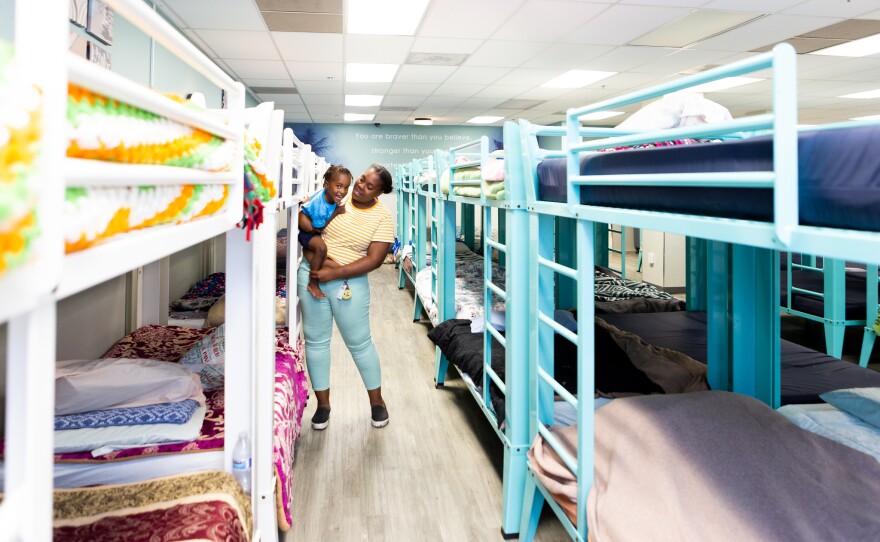Homelessness has been a hot topic in Oceanside lately.
Encampments have been blocked with rocks. People have left the city’s motel voucher program. The city will soon get its first year-round homeless shelter. And who will run it?
The answer is the San Diego Rescue Mission.
Ignoring recommendations by Oceanside city staff and Housing Commission, the city council voted to make the Rescue Mission the service provider for Oceanside’s shelter.
RELATED: Mobile Laundry Trailer Launches In North County
“I didn’t think we would get it, and in the end they selected us to be their service provider and I can’t tell you how excited we are,” said Donnie Dee, the president of the San Diego Rescue Mission.
The other organization in consideration was Interfaith Community Services.
Interfaith’s proposal for the shelter came with $1 million annual operating costs while the Rescue Mission’s proposal did not.
“I do believe that the city council of Oceanside selected us primarily because we committed to raising our own funds to operate. That’s about a $900,000 a year budget. We can do that. I have 29,000 active donors,” said Dee.
RELATED: Oceanside Woman Runs And Funds A Motel Shelter For The Homeless
The shelter will be set up at the Ocean Shores High School campus off Oceanside Boulevard and east of El Camino Real.
The city of Oceanside owns the land.
“It’s different for us because we own our properties, we own our assets, but what I love about this is. It's an opportunity for the public and the private to work together on behalf of the people who are living on the streets,” said Dee.

Dee’s proposal includes remodeling the former school building rather than tearing it down.
“It's got a bunch of individual rooms that were classrooms and we will break up those rooms around gender and around family orientation,” he said.
The Oceanside shelter will be open to men, women and families.
“We think it has the space for us to do women, men, women with kids and families. There’s a real lack for emergency shelters for families right now,” said Dee.
Leeanna Quirk and her husband have been homeless for over four years and are now staying in a donated RV. They know all too well the need for shelters for families.
“There’s nothing for families. That’s the hardest part. Me and my husband have been married 20 years and even when we went to the hotel program, they kind of told us, ‘Well would you be willing to separate and get rid of your dogs?’ But we don't want to be separated and I can't get rid of my dogs,” said Quirk.
Quirk said her dogs became her support when she lost her children to foster care and when she started getting seizures. She thinks the rescue mission’s shelter will be great news to the homeless in the area.
“I know a lot of people that want help and unfortunately they don’t know how to get it,” she said.

The Oceanside shelter will offer 50 beds with overnight and day use for 30 days.
“They’ll have 30 days to stay there and it’ll be through that relationship that we’ll figure out, ‘Do you need to go downtown and be a part of the long term program? Do you need to go to detox, do you need a skilled nurse facility?’ We’ll do triage at these facilities and figure out what's their path forward,” said Dee.
But the Oceanside shelter will not be a walk up facility.
“That property in Oceanside’s going to be a drop off facility. We’ll work very closely with the (Homeless Outreach) Team in Oceanside, with their police department,” said Dee. “We'll work very closely with other agencies and they will refer people experiencing homelessness that need a place to stay to the San Diego Rescue Mission Ocean Shores campus.”
But some people are concerned the new shelter may not serve everyone who needs help. Max Disposti is the executive director of the North County LGBTQ Resource Center.
He wonders whether the Rescue Mission’s plan may exclude the LGBTQ homeless population.
“What is your track record? What do you do when a trans person comes in, how do you protect them? Can I take a look at your intake form? What does your intake form show or doesn't show to be sure this population is included?” Disposti said.
He said a large part of the homeless population identifies as LGBTQ and the lack of inclusiveness pushes them away from shelters.
“There is a reason why our population, the queer population, prefers to sleep under the bridge, literally. You know we're using public land and resources, they’re supposed to guarantee that protection,” he said.
Dee said the San Diego Rescue Mission has never denied access to services based on religious belief or sexual identity.
He said he welcomes community partners to the Oceanside facility.
“We’re so committed to that approach that we’ll actually have office space in our facility in Ocean Shores for other agencies because we want that kind of relationship. This isn't just our thing, not just a San Diego Rescue mission thing. It’s the community of Oceanside project and we want to serve that city well,” Dee said.
When asked if the Rescue Mission plans on incorporating an LGBTQ agency in the Oceanside shelter, a spokesperson responded: “We will be working with any partner who is assisting in ending the homelessness of the people we are serving. We’ll also be working with the City of Oceanside to determine space for outside agencies to provide direct client services on site.”
Disposti said community relationships are very important when it comes to referring people to agencies for help. Dee said the San Diego Rescue Mission will also be launching an outreach program to earn people’s trust in the community.
“My alumni ambassador coordinator starts next month. She is going to be building an army of past graduates that are gonna be able to speak into the situations of people who are currently living on the streets because they were once there,” said Dee. “We really need to convince them through relationships and through trust that there's a path forward. And we believe that path starts at a shelter, probably ends up on a long term program, and someday we get to celebrate your life and your accomplishment at a graduation.”
Dee said remodeling of the facility will start later this year and the shelter is expected to be up and running by next year. The future shelter sight is near a couple of businesses, a transit center, and away from residential homes.
Javier Vidrio, the owner of Mariscos Ensenada located near the shelter sight is concerned about the future of the shelter.
"I don't really like the idea. We already have an issue with them. They live back there," Vidrio said, gesturing toward an area behind the restaurant.
"Obviously this is a restaurant and people eat out here. They're not clean. It's not good for our business. I know they have to live somewhere, but I know it's going to be hard for us as a business," he said.

The San Diego Rescue Mission currently operates a 360 bed shelter in Downtown San Diego.
“Sixty beds are used for overnight emergency shelter for women and kids, and the other 300 beds in this facility are set aside exclusively for a faith-based 12 month rehabilitation. They live with us for a year and during that year we’re doing everything we can to build a program so they get off the streets permanently,” said Dee.
The downtown location will be used to refer people from the Oceanside shelter if they are interested in their faith based residential program.
Dee said they are also currently in Escrow for an eight acre property in National City that could be a 200 bed facility.
That deal is expected to close at the end of the year.








